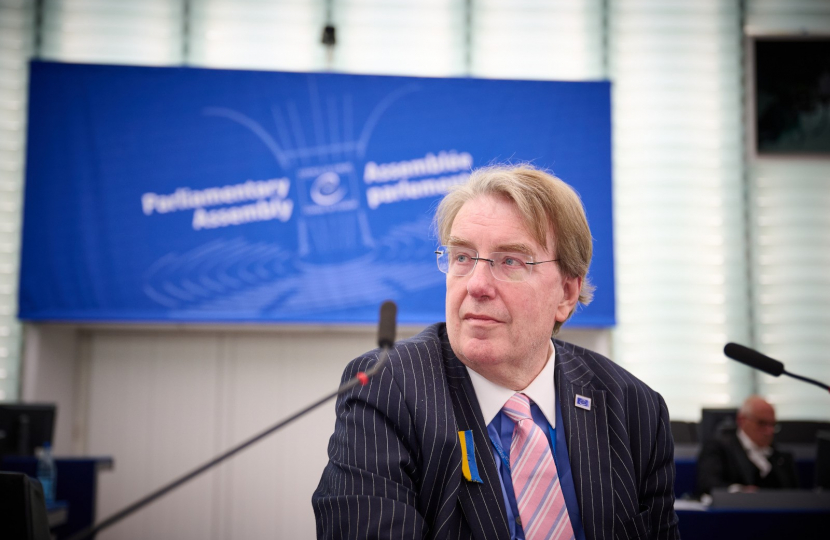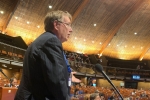
The Parliamentary Assembly of the Council of Europe has four Plenary Session each year. Below is John's Delegation Leader report for the April 2023 session.
Leader's Introduction.
The April Plenary Session took place in the hemicycle of the European Parliament. The reason for this is that the Council of Europe hemicycle is being renovated which will take a year. The European Parliament hemicycle is of course much bigger than that of the Council of Europe. The European Parliament has to seat 705 MEPs whereas the Parliamentary Assembly of the Council of Europe sits only 306 members. The European Parliament chamber is a vast space which loses a lot of the intimacy that characterises the chamber of the Council of Europe. The Session included a large number of topics some of which are set out below. However, one important issue was raised outside of these topics and that was the admission of Kosovo to the Council of Europe. The Committee of Ministers (the second chamber of the Council of Europe) voted 33 votes in favour, seven against and five abstentions. The next stage of the admission process is to refer the matter back to the Parliamentary Assembly where a complicated process involving the appointment of two eminent lawyers to examine the case and the views of the Assembly’s Committee on Political Affairs and Democracy are sought. Some countries such as Hungary voted against Kosovo’s membership and others such as Greece and Slovakia abstained. Serbia has taken a strong position against Kosovo’s membership. It is quite clear that Kosovo has a lot to do to progress its case but the UK Delegation to the Council of Europe and both Government and Opposition are fully in support.
There was also much discussion about the European Court of Human Rights and the UK position after the Illegal Migration Bill was passed by the House of Commons on 26 April. However, a full-scale attack against the UK was avoided at this Session.
The importance of the Convention (and of the Court) was raised in the context of the Good Friday Agreement for which we held a well-attended reception jointly with the Irish Delegation. From the UK both H.E. Sandy Moss, Permanent Representative, and I spoke at the event.
John Howell OBE MP
Leader of the UK Delegation to the Parliamentary Assembly of the Council of Europe
REPORT APRIL 2023 PLENARY SESSION
The main topics discussed are set out below. After an initial session on the Progress Report of the Bureau and the Standing Committee presented by Ian Liddell-Grainger MP the next session was a question time with the Secretary General, Ms Marija Pejčinović Burić.
Question time: Ms Marija Pejčinović Burić, Secretary General of the Council of Europe. The Secretary General took questions on the Lachin Corridor, minority rights and Kosovo as well as on the Council of Europe Summit proposed in May this year. John Howell MP participated in this session. He asked a question about future Summits and what was to be included in them which could not be included in May’s Summit. The Secretary General replied that much of May’s Summit would be concerned with issues relating to the Russian war of aggression against Ukraine.
Annual activity report 2022 by the Council of Europe Commissioner for Human Rights. The meeting heard from the Commissioner for Human Rights, Ms Dunja Mijatović, who told the Assembly that “the year 2022 will be remembered as the year of mass atrocities on European soil”. Much of the Commissioner’s work had concerned the Russian war of aggression and she had visited numerous neighbouring countries. The Commissioner condemned Russia's failure to return the Ukrainian children taken by Russia as a clear violation of their human rights.
Address by Ms Þórdís Kolbrún Reykfjörð Gylfadóttir. Minister for Foreign Affairs of Iceland and Chair of the Committee of Ministers. The Minister set out her assessment of the achievements of the Icelandic Presidency - now in itsfinal stages - and reviewed the priorities for the Reykjavik Summit which takes place in only three weeks’ time. The Summit is the Council of Europe's fourth since its establishment.
The Minister said that Iceland had found the period of its Presidency turbulent and traumatic and pointed to the situation in Ukraine. The Minister pointed out that member States have committed themselves to adhere to a set of international laws, including human rights law. This applied both to those member States which were the founding members of these organisations and to those which have gone to great lengths to fight for their independence and sovereignty based on these laws. The Minister also said that societies based on liberal democracies and respect for the rights of the individual have created the greatest human welfare and economic prosperity in human history.
Current affairs debate: #RoadToReykjavik. This debate included a statement by the President of the European Court of Human Rights, Ms Síofra O’Leary. It was recommended that the Summit in May should show great ambition, long-term vision and political courage. The Parliamentary Assembly called for an ad hoc international criminal tribunal to investigate and prosecute the crime of aggression committed by the political and military leadership of the Russian Federation. It strongly supported the establishment of a Commissioner for Democracy to engage systematically with member States and provide early warning and rapid reaction. The Assembly further supported a new legally binding Council of Europe framework to guarantee the right to a clean, healthy and sustainable environment. The President of the Court stressed the divergence within Europe and the need to strengthen the principle of subsidiarity.
European Convention on Human Rights and national constitutions. Rapporteur George Katrougalos called for effective dialogue and synergetic co-operation between national governments and the ECtHR. In his speech Sir Edward Leigh MP said there was no reason why the UK should leave the European Court of Human Rights or the Parliamentary Assembly, although the UK had to have the freedom to be able to deal with the migration crisis in the way that it wanted to. John Howell MP said that the importance of national constitutions was now at the heart of the Convention. The Brighton Declaration of 2012, which was signed by every one of the then 47 member countries of the Council of Europe was crucial. If there was greater awareness of this Declaration, he said, there would be less of a problem in many countries, including the UK. He pointed to the development of the term "subsidiarity" to describe how the Court now acted. What the Declaration says is that the Court should not normally intervene where national courts have already applied the Convention properly. However he warned that the Brighton Declaration had taken 9 years to come into force. Ruth Jones MP commented on the way that the Welsh and Scottish governments dealt with things and pointed out there were always going to be human rights issues where political pressure exists and that this should avoid attempts to score political points. She also said that what is in the UK’s best interest is always a question open to interpretation and on occasion, misrepresentation. Lord Keen said that there was room for manoeuvre that the Strasbourg court must accord to national governments when considering their obligations under the Convention and that a failure to concede that margin to national governments would offend the principle of subsidiarity. It did not give national governments an unqualified power for the application of Convention rights. But the principles of democracy, legality, subsidiarity and proportionality make clear that national governments have a legitimate and important role in demarcating rights under the Convention. Jeremy Corbyn MP added that the UK Government’s constant criticism undermined the principles of the Convention and that it was now proposing to Parliament that Britain limits its acceptance of the Court’s judgements. Mr Corbyn strongly supported the call in the draft resolution to ask “all governments to refrain from taking any steps that could exacerbate any potential conflict between the national constitutional order and the European Court of Human Rights”. He saw the British Government position as an attack on desperate asylum seekers and refugees and called on the Assembly to defend human rights and support asylum seekers.
Assessing the functioning of the partnership for democracy. The partnership for democracy was established in June 2009 to strengthen the existing working relations between the Council of Europe and parliaments of neighbouring countries, as well as to promote parliamentary democracy, respect for human rights and fundamental freedoms and the principles of the rule of law in these countries. It expressed the Assembly’s wish to open up to broader co-operation with its neighbours. With this new status, the parliaments of neighbouring countries were offered an institutional opportunity to benefit from the Parliamentary Assembly’s experience in democracy-building and to participate in the political debate on common challenges which transcend European boundaries. John Howell MP congratulated in particular Morocco on its spectacular success story and pointed to the renewed efforts which should be made to seek a resolution of the conflict between Israel and the Palestinians.
Political strategies to prevent, prepare for, and face the consequences of natural disasters. This report looked at natural disasters whether earthquakes or climate-induced. Kate Osamor MP commented that the report pointed out that the regularity and intensity of natural disasters was only set to increase. She called for member States to outline measures to respond to extreme climate events and noted that even London, generally not at high risk of natural disasters, was becoming increasingly susceptible to flash floods. Kate Osamor pointed out that the UK had had its first trial of an emergency alert system for mobile phones. She wanted more provision for responding to and preventing disasters. John Howell MP also spoke in the debate and pointed out the effect of natural disasters in Turkey on human rights and the rule of law. David Morris MP said that world institutions should prepare and plan for natural disasters, making sure that when these catastrophes happen, they do not get caught out. Ruth Jones MP said that confronting large-scale natural disasters required a robust international response and must be tackled with a clear and united front. She added that and it was all of our jobs to ensure that governments are encouraged to live up to their highest potential in an increasingly dangerous world which is clearly exacerbated by the clear climate crisis. Theo Clarke MP added that the UK Government was very quick to respond and mobilise resources as the UK International Search and Rescue Team had arrived in Gaziantep in Turkey on the 7th of February, just one day after the earthquake. She pointed out that the UK’s £25 million support package had been instrumental in funding the UK joint Ministry of Defence-FCDO field hospital in Turkoglu.
Implementation of judgments of the European Court of Human Rights. This report looked at the implementation of judgments of the European Court of Human Rights and how it relates to the core work of the Council of Europe in identifying human rights violations, in assisting member States, in redressing shortcomings and deficiencies in line with their obligation vis-à-vis the European Convention of Human Rights to which they are bound. Sir Christopher Chope MP commented that the draft resolution and draft recommendation illustrated the impotence of the organisation. He expressed disappointment that the Rapporteur did not refer in his opening remarks to the case of Mr Osman Kavala. Lord Foulkes asked why the UK was so critical of the European Court of Human Rights, where it is often referred to, in a sort of off-hand way, as “the Strasbourg Court”? After all, the UK has the fewest number of referrals to the Court and even fewer critical decisions. Sir Edward Leigh MP commented that the European Convention was a compact of international law. It was an agreement freely made and freely signed up to by individual States. Any change in the powers of the European Court of Human Rights should be debated and agreed in a transparent manner by democratically accountable governments.
His Excellency Mr Guðni Th. Johannesson, President of Iceland. The Assembly heard from the President of Iceland, who said that the Council of Europe was the perfect venue to tackle issues of ‘my country right or wrong’. It was founded by independent states in the wake of the Second World War in order to safeguard and promote fundamental values and principles: the principles of democracy, human rights, and the rule of law – principles of interdependence. The President commented on the forthcoming May Summit and what will come out of it. He also commented on nationalism and the need for tolerance and inclusivity. John Howell MP asked a question about the legacy, outside of the Summit, of Iceland’s Presidency. The President said in essence that Iceland had delivered.
Deportations and forcible transfers of Ukrainian children and other civilians to Russian Federation or to Ukrainian territories temporarily occupied: create conditions for their safe return, stop these crimes and punish the perpetrators. This debate was held with a contribution by video link from the First Lady of Ukraine Madam Olena Zelenska. The report pointed out the tragedy of forced deportations and of the massacres of helpless civilian populations; the bombing of hospitals, maternity units, schools and water and energy plants; of rape and torture; and the blocking of humanitarian corridors. The report focused on describing and denouncing the practices of deportations and forcible transfers of children and civilians and breaches of international law. While the exact number of deported children was not known, it is realistically possible that several hundred thousand children have been illegally taken to Russia, Belarus and occupied territories. Madam Zelenska said that we were critically short of time. Every day, every hour in captivity breaks the psyche of the children and their families. It takes away their health and lives…. “we do not only need the world's concern, we need all possible effective help to free them. We need not only rescue but also justice.”
Current affairs debate: Russia’s role in escalating tensions in the Republic of Moldova. This debate looked at the level of aggression on the part of the Russian Federation and called on the Council of Europe to redouble its efforts to support the Republic of Moldova, with the aim of strengthening the country's democratic resilience and to accompany it resolutely on the path of its integration into the European Union. Members called on the Reykjavik Summit to express full political support for the Republic of Moldova and for the Parliamentary Assembly to remain vigilant, particularly because a number of national elections are due to take place.
Safeguarding democracy, rights and the environment in international trade. The Rapporteur for this report was Geraint Davies MP and the debate was Chaired by John Howell MP. Mr Davies said that the future of the planet and of democracies would depend upon whether trade deals green or blacken our global economy and whether they safeguard or undermine human rights and democracy. Mr Davies commented that we needed to be very careful on what we agreed in trade deals and that we should use these to set out our values, whether it's environment, climate, health, or rights etc. and embed these in trade deals so that the power of the environment was commensurate with the power of investors in terms of enforceability.
Mr Davies pointed to the position of the Energy Charter Treaty, where he wanted to change the balance of power in favour of the environment; to minimise the lifespan of the energy charter treaty; to obtain environmental enforcement commensurate with investor power; to see the right to a clean and safe and healthy environment at the top of the agenda; to see the United Nations asking the International Court of Justice to take forward climate change issues; and to retrofit existing trade deals so that they are consistent with our obligations in terms of global environment treaties and in terms of Sustainable Development Goals. Finally, Mr Davies wanted to ensure the democratisation of the parliamentary process leading to these trade deals, which last for generations.
Youth and the media. This report looked at the role of social media as an important tool for young people who increasingly have their say in today's crucial issues and global challenges including the environment, sustainable development and human rights. But social media also had risks that can be harmful for young people such as disinformation, manipulation, incitement to violence, online harassment and belief in conspiracy theories. John Howell MP spoke and said that a crucial role that the Assembly had to play was in designing the rules that apply to social media, particularly for young people. Mr Howell pointed to the wording of the report which said "the Parliamentary Assembly considers it vital to ensure safe social media use for young people". The emphasis was on the word "safe".
The next Plenary Session of the Parliamentary Assembly will take place 19-23 June 2023.


